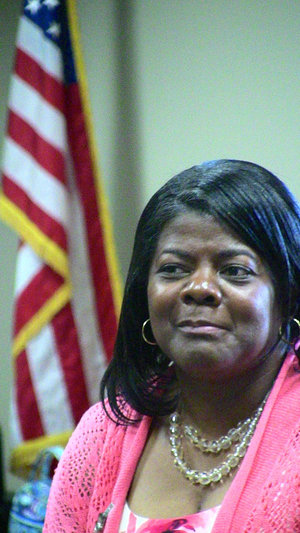Extension Director Works for Community Engagement
Dallas County Extension coordinator Callie Nelson has been working for the Alabama Cooperative Extension System (ACES) for more than 20 years. In that time, she has had her hand in agricultural projects, 4-H development, youth forums and development, leadership training, disaster relief, natural resource management, health education and so much more.

Part of ACES’s mission is to improve the quality of life and economic wellbeing of all Alabamians. Many Extension agents try to do this through a diverse range of programs, and Nelson is clearly no exception.
One of ACES’s newer focus areas is community development and citizen engagement. While their programs have always improved and educated communities, many Extension offices have more recently been working towards specific civic partnerships to directly address community issues.
Nelson has been a bit of a trailblazer in this push for civic connection and Dallas County is better for it. The agent says that her goal is always to get people working together to create a better community for all. She says that partnerships and cooperation are the best way to get Selma past historically tough issues and on to a better quality of life.
One of Dallas County’s successful civic programs is “Study Circles”. Nelson heard about the program while at a conference and implemented it in the county in 2009. Study Circles bring community members together to talk about poverty and other issues in their cities. The discussions give people a chance to talk about issues such as poverty and can spur action planning and collaboration so the conversations don’t stop when the cars leave the parking lot. Study Circles promote the empowerment of citizens and cooperative action, things that Selma and many other communities can benefit from.
Nelson and her Extension office saw success from early Study Circles sessions and have since convened and led many other community forums and group conversations.
Nelson says she started thinking about the value of community dialogue after attending a Kettering Foundation workshop on community development. The workshop led her to think about the importance of sharing diverse perspectives in communities and educating people about the various approaches there may be to solving a problem. She says she learned about better ways to provide safe space for diverse groups to talk about issues and then work toward action to address issues.
Nelson says people are often surprised when they find they share interests with neighbors from different backgrounds. Fortunately, many folks are often interested in building relationships around these common interests.
Nelson says that even she has been surprised by the willing collaboration she has experienced through the forums and circles. These discussion groups provided chances to meet and build relationships with people that she might not otherwise meet in her job or daily life.
They have also given her the chance to really listen to people and focus programming around their needs. Nelson says she has seen powerful results from projects that address specific needs and are backed by citizens who care about and are informed on the issues.
The Kettering workshop also led her to reevaluate her role as an Extension coordinator. Nelson says that one of her favorite things about Extension is that it is a neutral party. This gives her a chance to projects for her area, build partnerships and connect citizens with resources. She says expanding her role like this has opened up many possibilities for Extension programs to have a wide effect on communities.
A real example of this progress is the Tipton-Durant walking trail and playground built in the Selmont community in 2013. This project that came out of a Study Circles session was a collaboration of the Strategic Alliance for Health, a community group that worked towards health education and participation in Dallas County, and many citizens. The trail exists today to serve everyone in the community, and Nelson says it is a great example of citizens seeing an area of need in their town and working together to meet it. For more on how citizens worked together to create the trail and other opportunities see http://vimeo.com/85177195 (http://vimeo.com/85177195).
Another need-meeting project that Nelson found successful was “Turning the Tide on Youth Violence”, an educational forum centered on a current hot topic: bullying. Nelson says that many youth participants in the Study Circles programs expressed concerns over bullying in their schools and communities. So last year, Dallas County Extension and several other groups, including the David Mathews Center for Civic Life, collaborated to host the antibullying summit in Selma.
The session was attended by more than 200 people and led to several school plans to address the issue. It also spurred many valuable conversations between students, parents, and supportive citizens about bullying and what they can do to turn the tide.
Nelson says she plans to continue expanding the community engagement services offered by Dallas County Extension because she has seen the real effects that authentic citizen involvement can have in communities. It will take the work of many people for Selma and Dallas County to see positive community change, but it can be done. Nelson says she believes that Extension can play a role in this change by continuing to offer educational services, capacity building and leadership training, and creating space for all voices to be heard.
Tags: Selma